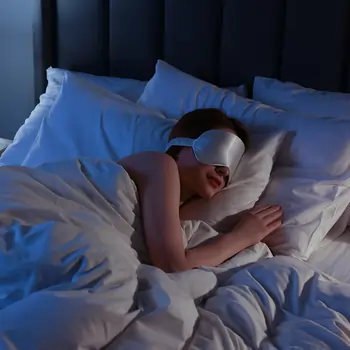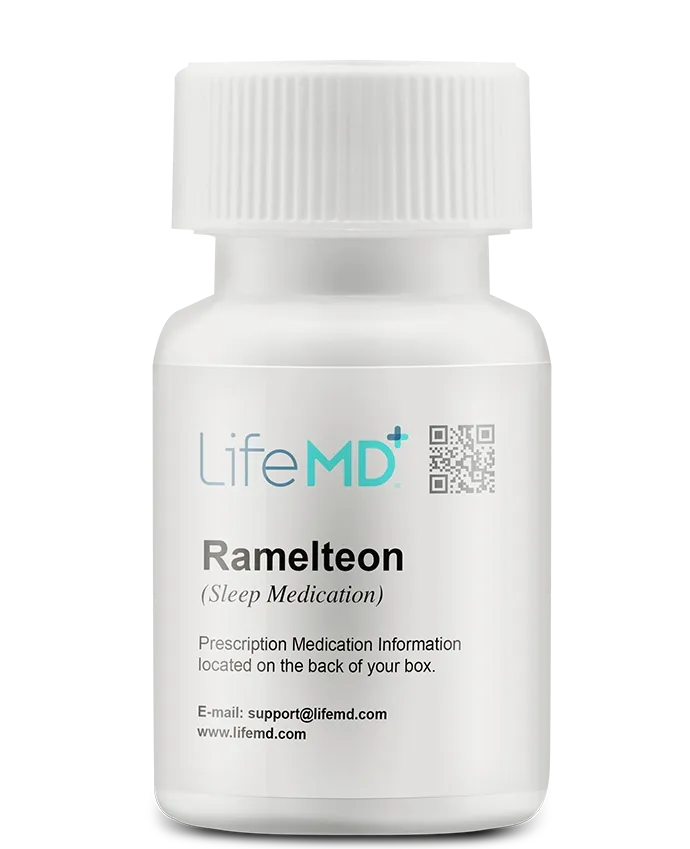What is Sleep Hygiene? Tips for Healthy Sleep Habits
Getting good quality sleep is essential for our bodies to function properly. Ensuring you get enough sleep can lower the risk of serious health problems, reduce stress, and improve both physical and mental health.
However, lifestyle factors often prevent us from getting a good night’s rest. Noise from nearby traffic, light emitted by electronics, and having little time to relax before bed can all contribute to poor sleep.
Practicing good sleep hygiene is the best way to get the rest your body needs to remain healthy, restore itself, and fight off diseases.
Tired of restless nights?
Don’t let insomnia hold you back. Take the first step towards better sleep with LifeMD.


What is Sleep Hygiene?
Sleep hygiene refers to a set of practices and habits that ensure you get the high-quality sleep your body needs to function properly.
These healthy habits help to create an environment and routine that is conducive to rest, helping you to fall asleep and remain asleep throughout the night.
Practicing good sleep hygiene includes optimizing your bedroom for uninterrupted sleep, sticking to a schedule, and establishing a pre-sleep routine.
According to the Centers for Disease Control and Prevention (CDC), the recommended number of hours of sleep per day for a healthy individual is as follows:
The Recommended Number of Hours of Sleep Per Day for a Healthy Individual |
|---|
Age group | Recommended hours of sleep per day |
Newborns between 0 to 3 months | 14 to 17 hours |
Infants between 4 and 12 months | 12 to 16 hours |
Toddlers between 1 and 2 years | 11 to 14 hours |
Preschool children between 3 and 5 years | 10 to 13 hours |
School-age children between 6 and 12 years | 9 to 12 hours |
Teens between 13 and 18 years | 8 to 10 hours |
Adults between 18 and 60 years | 7 hours and more |
Adults over the age of 60 | 7 to 9 hours |
Why is it Important to Get Restful Sleep?
Low sleep quality is known to link to serious health problems, including kidney and cardiovascular disease.
It is also connected to high blood pressure, obesity, strokes, and depression.
When you sleep, your brain also eliminates waste buildup. Therefore long-term poor sleep has been linked to cognitive decline, including dementia.
In fact, research has shown that sleep deprivation increases the risk of early death and plays a role in human mistakes that lead to tragic accidents.
Poor sleep hygiene can also cause:
Daytime sleepiness
Anxiety
Getting sick regularly and prolonged illness
Diabetes
Worsened chronic lung illnesses
Impaired mental performance
Sleep Hygiene Practices for a Good Night’s Rest
Establish a consistent sleep schedule
One of the best ways to improve your sleep health is to go to bed and wake up at the same time each day. This regular sleep schedule will help your body naturally recognize when it should fall asleep and when it should wake up.
Establishing a sleep schedule can help you fall asleep faster and prevent you from tossing and turning for hours. It can also ensure you get up on time each day to avoid being late for work and school commitments, which could cause added stress.
It’s important that you maintain your schedule throughout the week, including on weekends. It may be tempting to sleep in late on days off, but this can disrupt your body’s natural rhythm.
Rather take daytime naps over the weekend if you feel you need more sleep.
Key Point: How to Adjust to a Sleep Schedule
First, you need to determine what time you need to go to sleep and wake up to get the optimal amount of sleep for your age.
Next, go to bed and wake up five to 10 minutes earlier each day until you reach your desired sleep routine.
Your body will take time to adjust to a new sleep schedule, so it’s important to ease into it gradually.
Create an optimal sleep environment
The next part of good sleep hygiene is optimizing your environment for better sleep. Most importantly, your bedroom should be cool, dark, and quiet.
Here are some factors to keep in mind:
Temperature: Your bedroom should be between 60°F and 67°F at night.
Lights: Try to remove as many light sources from your bedroom as possible. For example, pilot lights on electronics that shine all night should be covered as these can disrupt your sleep.
Noise: Any amount of noise at night can lead to disrupted sleep. Try to minimize the noise around your room.
Key Point: Invest in Good Curtains
Curtains not only help to keep your room dark at night, but they can also form a barrier between your bedroom and any outside noise.
Investing in a set of thick, blackout curtains may help you sleep better as they reduce noise and light.
If your curtains aren’t enough, consider sleeping with an eye mask and earplugs to create an optimal environment.
Other important aspects of your sleep environment include your bed, pillows, and linen.
Purchasing a supportive mattress and pillow can help you get better quality sleep and reduce neck and lower back pain. Keeping your linens fresh and clean may also help you sleep more comfortably.
Use relaxation exercises to unwind
Going to bed while you’re still wide awake and stressed from the day can lead to insufficient sleep. You may have trouble falling asleep if you aren’t fully relaxed at bedtime.
Here are some ways to relax before bed:
Express your worries: Get everything weighing on you out on paper through journaling.
Create your to-do list: If tomorrow’s priorities are making you feel worried or anxious, write out your to-do list for the next day.
Meditate: Meditating close to bedtime will calm your mind and prepare your body for sleep.
Take a warm bath or shower: You may feel more relaxed and sleepy as your body cools down after a warm shower or bath.
Breathwork: Some deep breathing can relax your body and calm your mind, preparing you for sleep.
Stretch: Very gentle stretching before bed can loosen your muscles and promote relaxation.
Read a book: Reading gives your mind a moment to unwind and avoids exposure to blue light from electronic devices.
Try progressive muscle relaxation: This visualization technique helps you focus on allowing each muscle in the body to relax.
Do a digital detox close to bedtime
Light signals to your brain that it is daytime, which is when you should be awake.
The blue light that is emitted from electronic devices specifically can contribute to feeling wide awake and may even disrupt your sleep.
This is because blue light suppresses the body’s release of a hormone called melatonin which is responsible for making us feel sleepy.
It’s a good idea to stop using electronics such as smartphones, tablets, and even televisions at least an hour before bedtime.
Instead of looking at a screen, try reading a book or listening to calming music in low lighting.
Other Bedtime Habits for a Good Night’s Sleep
Aside from establishing a sleep schedule and optimizing your environment for rest, there are some other lifestyle habits you can consider to get better rest.
Avoid nicotine, alcohol, and caffeine before bed
While many people think smoking is a calming activity, it should be avoided before trying to sleep. As nicotine is a stimulant, smoking or vaping before bedtime can make it difficult to fall asleep and stay asleep throughout the night.
Alcohol is known to disrupt something called sleep architecture, which refers to the phases of sleep we experience every night. When you drink alcohol, each stage of sleep becomes fragmented or disrupted, which could result in waking up several times during the night.
Caffeine is also a stimulant that is known for preventing proper sleep. Avoid consuming caffeine for at least four to six hours before attempting to sleep.
Try exercising
Moderate regular exercise can promote better sleep. It helps to extend how long you stay asleep and reduces the amount of time it takes to fall asleep.
Both these factors can result in better sleep quantity and quality.
It’s important to note that you shouldn’t exercise right before bed as this can stimulate the body and prevent you from falling asleep.
If you feel you need to move before getting into bed, try some light stretches.
Maintain a balanced diet
The food that you eat can impact how well you sleep. For example, eating a lot of sugar and saturated fats during the day can lead to less restorative sleep.
Eating too much before bedtime can also affect sleep quality. You should avoid eating calorie-dense meals that are high in fat and carbohydrates for at least an hour before bed.
Develop a pre-sleep routine
Having a ritual you follow each night before bed can help tell your brain that it is time to relax and rest.
Your sleep routine could include some of the relaxation techniques we discussed earlier, but you could also try out other activities such as:
Changing into comfortable pajamas
Dimming the lights
Lighting a candle or diffusing essential oils
Practicing a soothing hobby or activity that you enjoy
Preparing your clothes for the following morning
Experiment until you find what works
It’s worth noting that not all the advice above will work for everyone. A good sleep routine and pre-sleep ritual are highly personal.
Explore different techniques and activities for a couple of weeks to find which ones help you sleep best.
When to Seek Medical Treatment for Sleep Problems
If you constantly struggle with trying to fall and remain asleep, you may have a sleep disorder.
It’s important to seek help from a healthcare professional if you struggle with sleep at least once a week or if you have concerns about the amount of rest you’re getting.
Seeing a doctor that specializes in clinical sleep medicine can help diagnose any sleep disorders you have. This involves analyzing your sleeping patterns and potentially prescribing medications to help you sleep better.
Where Can I Learn More About Good Sleep Hygiene?
At LifeMD, you can speak to a board-certified doctor or nurse practitioner online from the comfort of your home. A healthcare professional can provide you with the medical treatment you need if you are struggling to get good sleep.
Don’t let insomnia control your nights. LifeMD-affiliated physicians can prescribe FDA-approved, non-addictive medications to help you fall asleep faster. Start your treatment today.














